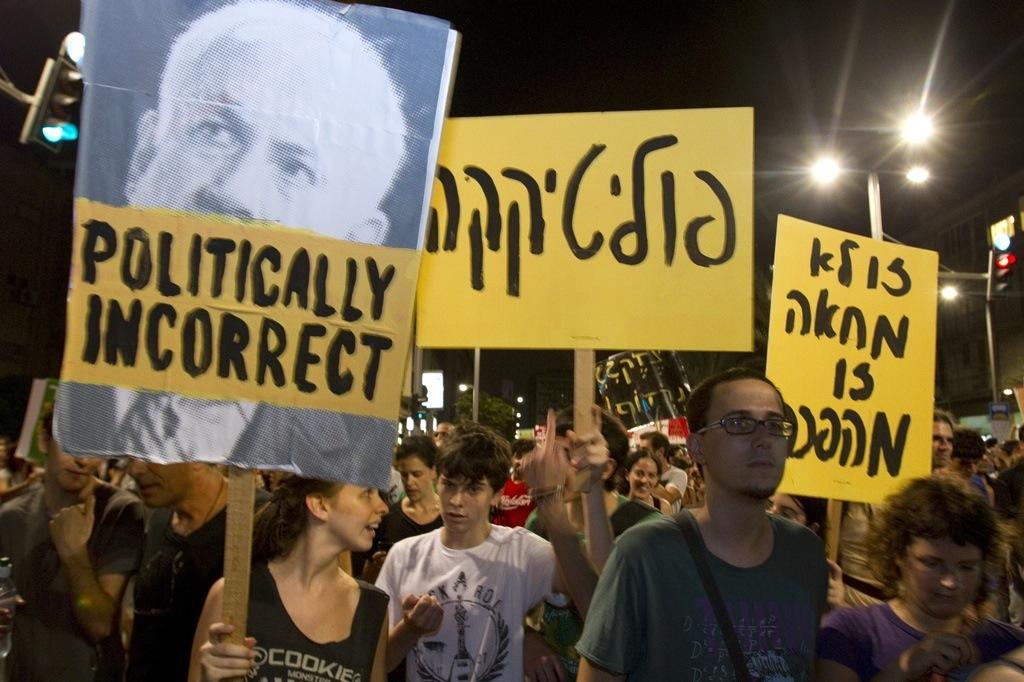Netanyahu: change is gonna come
Protesters march in Tel Aviv.
TEL AVIV, Israel — They pulled it off.
The young agitators who improbably upended Israel’s summer of 2011 with a string of protests unprecedented in the nation’s history culminated their efforts Saturday night with nationwide marches.
On Sunday, Prime Minister Benjamin Netanyahu told his cabinet that he would enact "genuine and responsible changes," according to a statement his office released.
The prime minister has appointed Manuel Trajtenberg, a Tel Aviv University professor, to offer recommendations about how to respond to the protesters’ demands. So far, Trajtenberg has held consultations with a broad swath of Israelis, and posted those conversations on YouTube.
He’s due to present his report in two weeks.
"This is a serious committee and it will submit to us serious recommendations," Netanyahu said Sunday, and promised to act "quickly" to enact reforms without plunging Israel into economic crisis. "We will maintain the economy, and we will correct what needs to be corrected," he said.
An estimated 400,000 to 450,000 people rallied in Israel’s main cities Saturday to demand the government institute massive social reforms, capping a six-week movement demanding change.
Daphne Leef, the 26-year-old who started the movement by pitching a tent in Tel Aviv’s Rothschild Boulevard two months ago after being priced out of the housing market, called Saturday's protests “the miracle of 2011.”
Nachum Barnea, a senior political analyst for the daily tabloid Yedioth Acharonoth, called it a “photo finish.”
As the organizers had hoped, this was the largest protest rally in the history of Israel, a nation with a population of 7 million people.
Main streets were sealed off, and traffic was diverted starting at 5:30 p.m., with police stationed at central squares in over 20 cities. Engineers were drafted to evaluate how many people could fit into Tel Aviv’s central square, Kikar HaMedina (in Hebrew, National Square.) They estimated it could safely hold 400,000.
In the end, somewhere between 300,000 and 350,000 filled the circle with citizens aged from eight months to 80.
Many businesses closed their doors to Saturday customers so that their employees to attend the rallies.
As in all the other demonstrations this summer, a general wave of fellow-feeling prevailed. No incidences of vandalism or sabotage were recorded.
Police stationed in Jerusalem pronounced themselves “bored—and relieved to feel bored.”
Approximately 60,000 people gathered in the nation’s capital, across the street from Prime Minister Benjamin Netanyahu’s residence, to demand substantial changes in the way the country is run.
Among their demands: increased investment in public housing, the legislation of tenants’ rights, free day care from age three months, and a curb on the informal cartels and monopolies that dominate Israel’s relatively small economy.
One of the people’s recurring chants, to the tune of a well-known lullaby, referring to Netanyahu’s nickname, went like this: “My Bibi has three houses. Maybe if he had fewer, I could have one too.”
At the Jerusalem rally, Itamar Luria, 54, a clinical psychologist and longtime peace activist called the protest movement “among the most moving things I have ever seen.”
“It touches upon the feeling people have that they are subjects of this state rather than citizens.”
Standing next to Luria, Michal Epstein, aged ten, who came to the rally with her father and older sister, bumped into five classmates in the crowds. “We’re going to talk about it in class tomorrow,” she said.
Among the speakers in Jerusalem, television personality Modi Baron captured the crowd’s political move in his booming greeting: “Good evening everyone, and happy revolution!”
The demonstration marked a turning point in the movement, with tent cities emptying out and becoming a forum for public discussion.
As the capital’s rally was breaking up around midnight, one of its more unlikely observers was New York hedge fund legend Michael Steinhardt, in town for a wedding. Around him young Israelis carrying signs like “Tahrir Square is not only in Cairo” and “Politics Stink! Hold your nose and jump in!”
He had a meeting scheduled with Manuel Trajtenberg, who heads the reform committee, the next day. “I’ll tell him I think he should issue recommendations for five, six, seven things and leave it at that,” he said.
“The most important recommendation will be to institute a permanent, non-political committee that meets once a year and issues recommendations for economic reforms. Something institutional, but non-partisan.”
Steinhardt had in his pockets a number of specific guidelines for Trajtenberg and, by extension, for Israel, beginning with the Warren Buffet-like recommendation that Israel institute an estate tax for its wealthiest citizens.
His second recommendation? An echo of the demands the bestirred the country all summer long: “The government has to build public housing. Immediately.”
And with that, Steinhardt headed off to his own residence, a historic jewel box that once housed the philosopher Martin Buber, not far from the prime minister’s home.
Every day, reporters and producers at The World are hard at work bringing you human-centered news from across the globe. But we can’t do it without you. We need your support to ensure we can continue this work for another year.
Make a gift today, and you’ll help us unlock a matching gift of $67,000!
